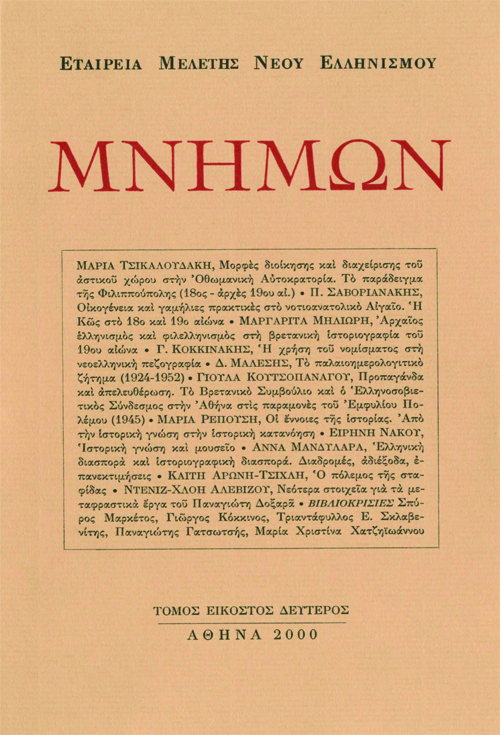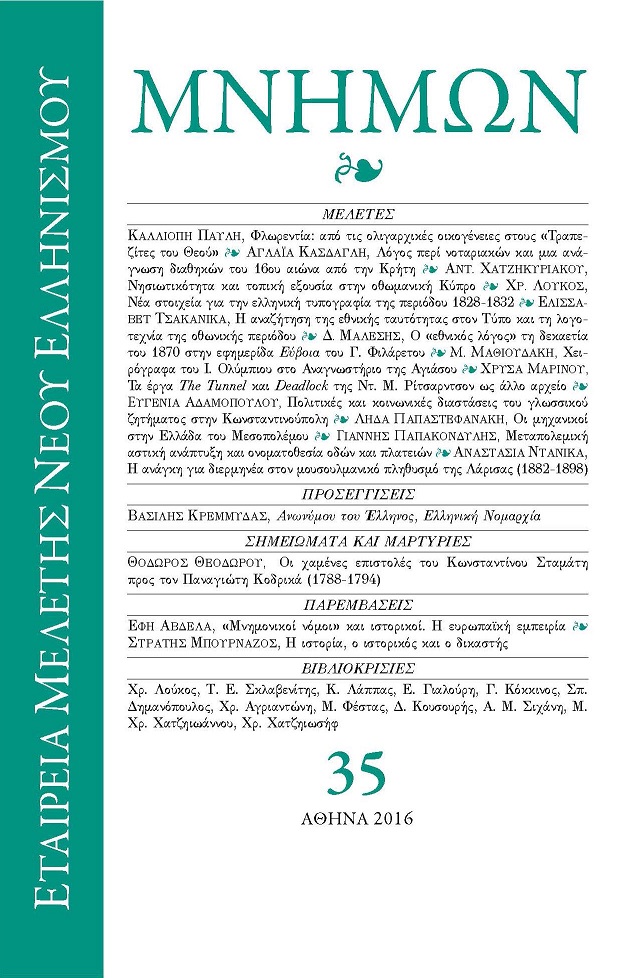ΤΟ ΠΑΛΑΙΟΗΜΕΡΟΛΟΓΙΤΙΚΟ ΖΗΤΗΜΑ (1924-1952). ΟΨΕΙΣ ΤΗΣ ΠΟΛΙΤΙΚΗΣ ΚΑΙ ΠΟΛΙΤΙΣΜΙΚΗΣ ΣΥΓΚΡΟΥΣΗΣ ΣΤΟ ΜΕΣΟΠΟΛΕΜΟ ΚΑΙ ΣΤΗ ΜΕΤΑΠΟΛΕΜΙΚΗ ΠΕΡΙΟΔΟ
Abstract
The aim of the current study is an attempt to address the problem which emerged in the Hellenic Society during the years of the inter war as well as the first post civil war period, due to the change of the calendar. The introduction, from the Hellenic Church, of the new (Gregorian) calendar in 1924 created a strong reaction among the believers wich resulted to the creation of a new movement, named Greek Religions Community of Genuine Orthodox Christians (C.O.Ch.). This conservative minority, having had a great influence, insisted in the reinstatement of the old calendar and caused important conflict in the Hellenic society. The issue is examined from a political viewpoint, since the G.O.Ch. functioned as a pressure group towards the governments, demanding the free exercise of their religious duties. The governments appeared rather uncourageous in facing the problem, as they relied on G.O.Ch's vote. However, there had been systematic chasing persecutions against their clergymen, with them arrested or sent to the exile, facts which aggravated the problem. In this article, we also attempt to analyse the ideological stigma of the G.O.Ch. movement as their moved against all innovations of West-European origin and they declared their dedication to the traditional customs. Another aspect of the issue, concerns the so-called Macedonian issue and since the Church as well as many politicians considered the G.O.Ch. as being Serving the Yugoslav propaganda between the Slavonic-speaking minority of Macedonia, given that the Serbian Church maintained the old calendar. The C.O.Ch. Church attempted to defend itself against those accusations claiming that the change of the calendar served the political plans on the northern neighbours.
Article Details
- How to Cite
-
ΜΑΛΕΣΗΣ Δ. (2000). ΤΟ ΠΑΛΑΙΟΗΜΕΡΟΛΟΓΙΤΙΚΟ ΖΗΤΗΜΑ (1924-1952). ΟΨΕΙΣ ΤΗΣ ΠΟΛΙΤΙΚΗΣ ΚΑΙ ΠΟΛΙΤΙΣΜΙΚΗΣ ΣΥΓΚΡΟΥΣΗΣ ΣΤΟ ΜΕΣΟΠΟΛΕΜΟ ΚΑΙ ΣΤΗ ΜΕΤΑΠΟΛΕΜΙΚΗ ΠΕΡΙΟΔΟ. Mnimon, 22, 135–169. https://doi.org/10.12681/mnimon.587
- Issue
- Vol. 22 (2000)
- Section
- ARTICLES
The copyright for articles in this journal is retained by the author(s), with first publication rights granted to the journal. By virtue of their appearance in this open access journal, articles are free to use (with the exception of the non-granted right to make derivative works) with proper attribution for non-commercial uses (licence Creative Commons 4.0). EKT/NHRF retains the worldwide right to reproduce, display, distribute, and use articles published in Mnimon in all formats and media, either separately or as part of collective works for the full term of copyright. This includes but is not limited to the right to publish articles in an issue of the Journal, copy and distribute individual reprints of the articles, authorize reproduction of articles in their entirety in another EKT/NHRF publication, and authorize reproduction and distribution of articles or abstracts thereof by means of computerized retrieval systems.
Downloads
Download data is not yet available.




